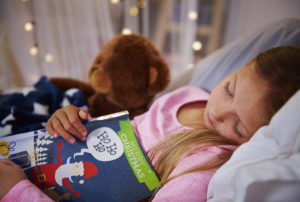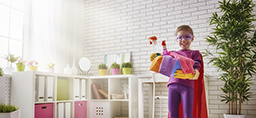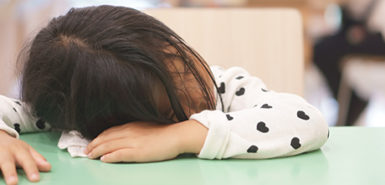
Exposure to bright light in the hour before bedtime can make it difficult for kids to fall asleep, family health experts warn.
As day changes to night, the body increases production of a sleep-inducing hormone called melatonin. But exposure to artificial light from light bulbs or electronic devices can disrupt melatonin production, according to a news release from the Family Institute at Northwestern University in Chicago.
Our Take
Jason Coles, MD, a pediatric sleep medicine specialist with Spectrum Health Helen DeVos Children’s Hospital, offers 8 tips for healthy sleep habits:
- Steadily adjust to earlier sleep and wake schedules. This will adjust biological clocks to new schedules.
- Avoid physical activity before bedtime and encourage physical activity in the morning upon waking.
- Establish a relaxing bedtime routine. Reading before bed is a good choice for kids of all ages.
- Create a sleep environment that is cool, quiet, dimly lit and comfortable.
- Keep television, video games and other electronics out of the bedroom. Avoid using them within one hour of bedtime.
- Eliminate or reduce caffeine.
- Eat well. Avoid big meals right before bedtime.
- Increase activity (just not near bedtime). Exercise and regular physical activity during the day improves sleep at night.
Even on weekends, keep a regular sleep schedule and avoid extremes. Having a regular bedtime every day increases the likelihood that kids, including teens, will get optimal sleep.
Keeping your child on a sleep routine will make it easier to wake them in the morning and they’ll feel better and more rested during the school day.
Recent research into the effects of light on preschool-age children found that youngsters are particularly sensitive to light exposure in the hour prior to bedtime.
“According to some researchers, evening light exposure, with its melatonin-suppressing effect, may increase the likelihood of sleep disturbances in preschool-age children,” the institute explained.
Reading bedtime stories in a brightly lit room can make it difficult for a child to fall asleep, the organization pointed out. And kids who walk into a brightly lit area to get a drink of water or tell their parents they heard a strange noise may also have trouble getting back to sleep.
Parents can help induce sleep by dimming lights in the child’s room and any areas they might walk into if they wake up, the institute suggested.
In addition, mobile electronic devices are a significant source of light exposure. As many as 90 percent of preschool-age youngsters use such devices, often during the hour before bedtime.
Research shows that melatonin remains suppressed for nearly an hour after the lights go off. The investigators suggested making the hour before their child’s bedtime a device-free period, or having the brightness on their handheld electronics set to the lowest level.
The study, by Lameese Akacem and colleagues at the University of Colorado, Boulder, was published online recently in Physiological Reports.
 /a>
/a>
 /a>
/a>
 /a>
/a>